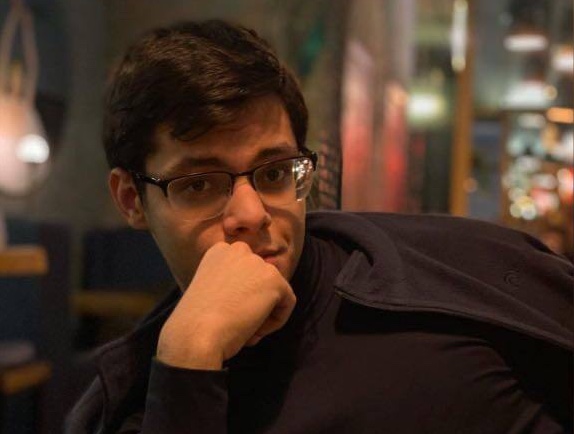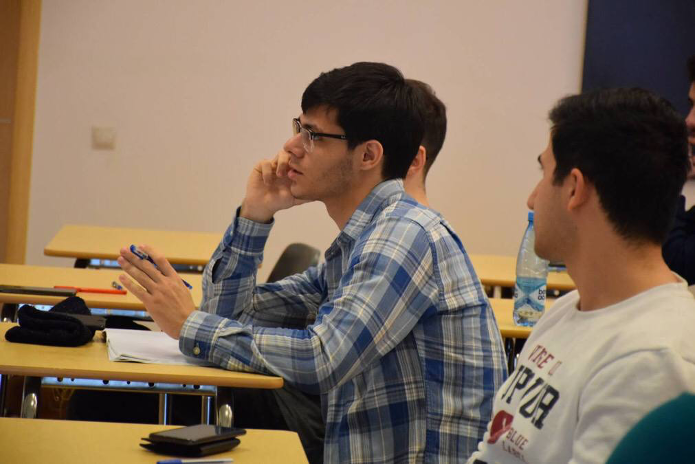"A Math Person Won’t Feel Bored in ICEF’s MSc Financial Economics"

Timur Kalyaev is in his second year of master’s studies and enrolled in ICEF’s Financial Economics programme after earning his bachelor’s in Applied Economics from the Moscow State University in Azerbaijan. Timur combines his studies with a part-time job. Here’s why he thinks MSc Financial Economics can be interesting to techies, what sort of difficulties international students face when applying, and how to best prepare for the admission interview.
About choice of major
I major in Mathematics and Computer Sciences and earned my bachelor’s from the Moscow State University Faculty of Applied Mathematics in Baku. My curriculum was in many ways similar to that of the Faculty of Mechanics and Mathematics. It was taught by Moscow-based faculty staff, but it had a greater concentration on programming and discrete mathematics and a duration of four years of packed schedule.
My choice of major wasn’t a conscious one, and it wasn’t until I got my first job experience that I learned the value of higher education and could approach my choice of master’s in a more mature way. Education is what helps one to become a full-fledged specialist – the one employers will want to win and pay and offer lucrative conditions. Top talents are actually few. They have fundamental knowledge and are able to handle very complex things, and many of them owe their skills to their choice of a good university.
The first thing I asked myself when choosing an academic direction to follow was what programmes there were that could best fit my mathematical background. Which of them would keep me interested and allow the best use of my previous knowledge? I mapped those that existed at the time, with no lower standards than I satisfied and at prestigious universities. I ended up with several schools abroad and HSE. I chose the latter because it didn’t require moving out of Russia.

Then, I made a list of fitting programmes and chose Financial Economics. It seemed to have the best fitting curriculum and it looked advantageous in terms of faculty qualifications and fundamental nature of its courses. What I also liked was that it came with a wide array of opportunities. Master’s degrees tend to be pursued mostly by people who are already employed but seek dedicated knowledge because they want to operate in some narrow slice of industry. In this sense, MSc Financial Economics is that middle ground between mathematics and economics that combines a high level of academic rigour with a fundamental grounding in subjects to kick start you in whatever field you choose for yourself. That’s the reason I chose ICEF.
What makes financial economics an attractive field for math people
Diverting to economics and finance sounded interesting also because I started to understand where abstract mathematics could be used in a more practical way. As a mathematics student, you don’t get too deep into applied side of mathematical deliberations, your task is to go as abstract in your reasoning as possible – something that may sound discouraging to those who aren’t planning a career in academia but want to be programmers or analysts.
Years of studying nothing but mathematics can cause students to be completely disoriented about their career paths
Conversely, as a Financial Economics student you soon start to understand where in the workplace you can use your skills and how, and you learn that also from your classmates. If you still remember well what you learned from Mathematical Statistics and Optimization Methods courses, you won’t have difficulty learning the core courses of MSc Financial Economics. Financial economics uses many different branches of math to optimize resource allocation process from the beneficiary value perspective. This is what game theory explores in economics to achieve most optimal distribution scenarios under varying conditions, whether pessimistic and optimistic.
Your love of mathematics will be rewarded with regressions: the curriculum teaches Econometrics – the course which requires thorough knowledge of statistics and data behavior and where mathematicians can outcompete economists because they are familiar with the “curse of dimensionality” and “outliers”. And there’s Stochastic Analysis, where you’ll learn about the factors that move stock prices up and down, influencing derivatives, options and other market instruments. A math person certainly won’t feel bored in ICEF’s MSc Financial Economics.
How to enroll as an international student
HSE offers international students a convenient procedure for early applying for its master’s programmes. Its international enrollment quota allows some to study for free or have tuition fees partly covered. Full information about the quota-based enrollment is usually available on the programme’s website, but be sure to apply early enough in winter.

ICEF has many students who are academically bright and earned their bachelor’s from highest rated universities. But let nothing stand in your way, participate in as many academic contests as you can to win distinctions – they will play a role in your portfolio and can increase your chances of getting admitted. International students can apply also through regular procedure as compatriots on a par with Russian applicants, but your status as such should have a valid proof. You qualify for the “compatriot status” if, for example, you have parents who were born on the territory of the USSR.
The track to follow is up to each individual foreign applicant. Make sure you read the website first and talk to programme administrators.
How to prepare for admission
You stand a better chance of getting enrolled if you provide full list of your achievements and a persuasive motivation letter. Ask your teachers for references beforehand. Your grade transcript and reputation of its issuer will play a role, too: the higher your grades and the rankings of your university, the more likely you are to score higher than average, although grades and rankings are largely subjective.
The most important and challenging part is the admission interview. Alongside with good knowledge, your interviewers will want to see how interested you are in your chosen field, what personal qualities you have, how quickly you can tackle non-conventional questions and whether you’re able try a more inquisitive approach. I can’t remember all the questions I was asked in my admission interview, but those I can remember were, “Are you aware of least squares method and what is it used for?” “Can you define Riemann integral?” “What can locking-in of a commodity price lead to?”
While preparing for my interview, I took care to find out about the courses that are taught at ICEF. I browsed the website and the Coursera courses on microeconomics, mathematical optimization methods, as well as books on macro- and microeconomics. The questions I was asked were indeed connected with the topics covered in those books and courses, so make sure you do your homework.
Why the programme can look interesting to techies
I think the programme has at least two strengths. First, it’s fundamental nature makes it suitable for both economists and techies. Those who are prepared to study hard and dig deeper will find it a good fit. That you will have to put some real effort is a fact, and in this sense MSc Financial Economics benefits those who wish to gain new experience by grinding away at studies. The programme furnishes you with a basis for precise understanding of how this world works, and your awareness of crucial processes will be higher than that of other people, bringing you to a whole new level.
You will find yourself among students who are academically bright and have different backgrounds. That’s was sets ICEF apart
My fellow students are the graduates of highly ranking schools. They come from different experiences, but they all are true professionals prepared to work hard. Our mutual exchange of experience brings new ideas for each of us, benefitting also techies.
At ICEF, you devote a lot of time to homework. Home assignments are rather challenging and there are deadlines to meet, designed to keep you in good shape. But be sure you will appreciate this experience once you’ve entered the workplace. It makes you a better job candidate and can increase your performance. Examinations and days of preparing for them develop stress-resistant personality, adding to the programme’s strengths. Combining studies with a job in your first year is simply impossible, and the deadline pressure makes it no less a challenge in the second year. I am working a part-time job and I must admit there are downsides to it. We all need to decide individually for ourselves when it’s time to start “gaining job experience”. Sometimes one shouldn’t rush into a career.
As to people trained in physics, they are bound to like ICEF’s programme from the start, I think: physics and economics operate similar methods and rely on empirical evidence. And because economists tend to lack precision in formulating their thoughts, expecting their words to hit home with listeners in overestimation of their awareness and ability, people with mathematical background may have it more difficult. But over time, you get used to the idea that the task before the modern economics (as suggested by my master’s programme as least) is not that of giving answers to all fundamental questions, but to generate solutions that fit best a given real-life problem and its conditions.
Tech-savvy people, too, are bound to find ICEF’s master’s programme echoing the courses that they studied earlier, as there is lots of stats and mathematics. Linked with mathematics is literally its every course, be it econometrics, hardboiled statistics, stochastic analysis, optimization problems or new macroeconomic or financial models.
About the academic and applied sides
The topics that my fellow students choose for their studies and research papers focus on the frontline knowledge and research, and there’s a lot of supervisors to guide us in our choice of topic and conduct of research. When it comes to research expertise, ICEF boasts a highly qualified team who are just the right people to prepare one for an academic career and admission to a PhD programme.
This programme is largely designed for students to be able to produce solid pieces of research, and this proceeds from LSE and ICEF’s viewing academic training as leading to true expertise and being for this reason superior to hands-on training. After all, practice comes with time. What future generations of national economy administrators need in the first place is fundamental knowledge.
Alongside courses that provide the theory of microeconomics, macroeconomics, contemporary models, mathematics and game theory, there are courses that are more hands-on and deal with investment analysis, M&A, and risk management. Optional courses span Python, trading, languages, but there simply isn’t time for everything. Last year our financial economics teacher laid extra focus on the practical aspects of the industry and had thus benefitted us immensely, as he gave us answers to many of the questions large banks ask in job interviews. I personally use a lot of knowledge from that course to make me better at my job.
About career plans
A degree like this has many career paths. ICEF is a reputable school and is valued by employers for its high academic standards.
The very fact of having been through ICEF makes you a high-profile candidate
Graduates find employment at large banks as analysts or become finance experts or try to make their way in consulting. Whatever your choice, make sure you work on self-development and participate in contests to make your portfolio look even more impressive. Courses such as econometrics, stochastic analysis and derivatives valuation will come in handy to those who choose to work for larger companies as product analysts or in data science. The career choices of the ICEF’s master’s programme graduates aren’t confined to one sole industry, their careers at Yandex are as successful as at Sber.
We choose careers that we think are best for us. MSc Financial Economics gives the grounding that prepares for development in a diversity of career fields.